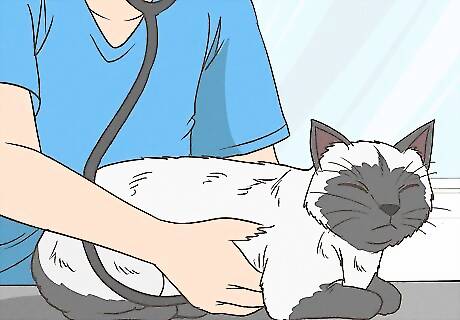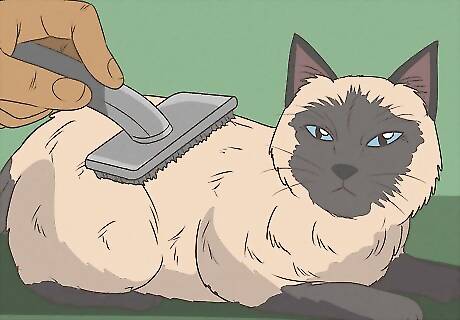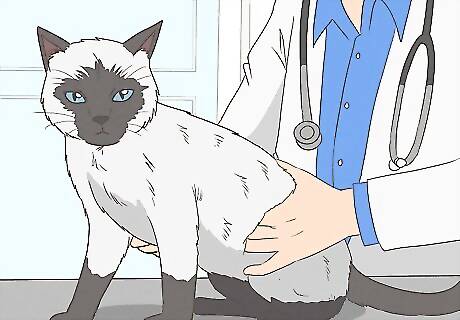
views
Feeding Your Siamese Cat

Pick a quality, high protein brand of food. Cats are obligate carnivores, which means that they need a diet based on meat. An ideal cat food is high in protein with a moderate amount of fat and few carbs. Read the ingredients to make sure the proteins come from animal and not plant sources. Dry food is relatively inexpensive. It will not dry out, so you can leave out a bowl to let your cat eat as they want throughout the day. Canned food provides a good level of protein and fat for your cat. They are more expensive, but cats often enjoy them more. All cat food should contain taurine. Siamese cats are sometimes prone to eye problems. Taurine may help prevent genetic eye issues in Siamese cats.

Talk to a vet before starting a raw diet. A raw food diet provides the cat with the necessary proteins and fats without the grains sometimes added into commercial cat foods. That said, you should talk to your vet first so that they can help you formulate a nutritionally complete diet that allows the cat to get all of their important amino acids and nutrients.

Feed your cat fixed amounts of food. Siamese cats are prone to obesity. Even a small amount of overeating can cause weight gain. Make sure to feed your cat regular meals using set amounts of food. Siamese cats should not be free fed. The label of your cat food indicates how much food your cat should get a day. This is based on your cat's weight. Talk to your vet about how much to feed your cat, especially if your cat is overweight. An overweight cat may need a restricted diet for a set amount of time. Keep an eye on your cat's body shape. A healthy cat has ribs that can be felt but not seen. An underfed cat will have visible ribs while an overweight cat has a large belly that covers their ribs.
Providing Basic Care

Take your cat to the vet once a year. Your cat should have an annual examination to check for parasites, health problems, and nutritional needs. If your cat becomes sick, you should take them to the vet more often. Make sure your cat is up to date on their vaccinations. If they have not been vaccinated, they may need to have shots for feline panleukopenia (distemper), feline viral rhinotracheitis, feline calici virus, and rabies. It is a good idea to spay or neuter your Siamese to prevent unwanted pregnancies.

Brush your cat's teeth regularly. Due to the shape of their head, Siamese cats are prone to dental problems. Brushing your cat's teeth regularly can help keep teeth healthy. To start brushing your cat's teeth, spend a few days using your finger or a cotton swab to massage their lips and gums. Once your cat allows their mouth to be handled, start dabbing a small amount of cat toothpaste on their lips. Once your cat is used to handling and toothpaste, use a toothbrush designed for cats to gently rub a small amount of toothpaste on their teeth. Do not use human toothpaste on a cat. You can buy special pet toothpaste at a pet store. Talk to your vet about how often to brush your cat's teeth. Cats with existing dental problems may need more frequent brushing.

Brush your cat regularly. Due to their short coat, Siamese cats do not need extensive brushing like other breeds. However, a light brushing with a stainless steel comb weekly will help your cat's coat stay clean.

Provide perches. Siamese cats love to jump and climb. Provide your cat perches throughout your home to meet this need. You can buy perches at pet stores, as well as devices such as kitty condos. You can also make use of your existing furniture to provide a perch. For example, clear out a section of a bookshelf for your cat.

Spend plenty of time with your cat. Siamese cats are a very social breed. They do not do well with minimal attention from their owners. Make a habit of giving your Siamese cat plenty of attention. Allow your cat to sit with you on the couch while you're doing things like reading and watching TV. Make time each day to play with your cat so it stays active and happy. Some Siamese cats prefer to sleep in their owner's beds. If you're comfortable, consider letting your cat in your bedroom at night.
Dealing with Breed Specific Issues

Deal with noise issues. Siamese cats tend to be very vocal. They often meow to greet you or when they need food or water. If excessive noise becomes a problem, take steps to quiet your cat. See if your cat actually needs something when they vocalize. If your cat is low on water, or if it's near dinner time, tending to the cat's needs can quiet meowing. You should not give in to excessive meowing all the time, however. If a cat is meowing for attention, wait until your cat quiets down to acknowledge it. This will teach your cat excessive vocalization will not be tolerated.

Talk to your vet about screening your Siamese for common health problems. Siamese cats, like all breeds, are prone to certain health problems. Talk to your vet about whether to screen your cat for specific problems. Siamese cats are prone to eye conditions such as glaucoma, bladder stones, heart problems, and certain cancers. Your vet may want to run tests, such as blood work, if they believe your cat is at a heightened risk of breed specific problems. If your cat is diagnosed with a health condition, your vet will help you develop a treatment program.

Prevent obesity. Siamese cats are more prone to obesity than other breeds. This is due to their small frame, which can easily pack on excess weight. Take measures to prevent your Siamese cat from becoming obese. Play with your cat each day. Schedule time for regular play sessions. You can have your cat chase a string and throw toys for it. Encourage your cat to play during the day by leaving out small toys, like plush mice, your cat can safely play with alone. Toy mice laced with catnip may be particularly enticing for your cat. Take your cat to the vet each year and have it weighed. If your cat is overweight, your vet will tell you how to adjust its diet to get it to a healthy weight.




















Comments
0 comment